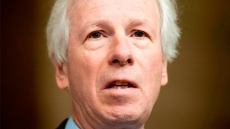OTTAWA — The federal cabinet will soon be asked to make an initial down payment on the navy's $104-billion frigate replacement program with an approval that will lay the groundwork for the new fleet, The Canadian Press has learned.
It will be asked not only to approve requirements for the new warships and cost tradeoffs, but also first-stage funding, which will allow defence planners to get the ball rolling.
But getting a revised cost estimate before the Liberal government has proven to be a painful exercise and budget planners at National Defence and the Finance Department engaged in a tug-of-war over projections ahead of Tuesday's federal budget, say several defence and government sources.
The sources, who cannot be named because of the sensitivity of the discussions, say Finance Minister Bill Morneau's office has been anxious for military planners to produce numbers on the Canadian Surface Combatant program for the last couple of months.
But defence officials have been reluctant to be pegged down because of the complex variables and that means they're only able to project numbers into the future with "about 80 per cent certainty," said one source with knowledge of the discussions.
Since the political fiasco over cost estimates for the F-35 jet fighters a few years ago, there's a desire to get the numbers as close to 100 per cent as possible, said the source.
The former Conservative government was hammered by the auditor general and the parliamentary budget officer for not including the full cost of buying and operating a fleet of 65 stealth fighters.
Internal documents and presentations leaked to The Canadian Press show that the federal cabinet was to receive an update this month on the frigate project, "including high-level requirements and cost-capability tradeoffs and the plan forward."
The November 2015 presentation said "funding decisions for the budget 2016" would be made, followed by a request to approve initial funding.
The estimated construction cost for 15 warships was originally pegged at $26 billion, but officials have long indicated privately — and sometimes publicly — that the price tag is outdated and will go higher.
One defence source said it could be "north of $40 billion" and the leaked documents warned cabinet soon after the Liberals were sworn in that "potential additional funding" for the navy's frigate replacements would have to be considered over the next few months.
Those figures do not include the lifetime maintenance and operating costs.

A separate presentation to defence contractors, on Feb. 23-24, 2015, said there is an "early projected estimate of $64 billion for the personnel, operations and maintenance costs over 30 years."
The eye-watering $104 billion total figure is an estimate that strictly depends on decisions the Trudeau government makes over the next six months, most importantly on the number of ships to be constructed.
What defence officials are hoping will come out of the internal debate over the next few months is "a solid commitment on how many ships the navy will get."
The Liberals have already taken preliminary steps to mitigate the enormous cost by proposing that the navy accept an existing warship design, rather than start from scratch. They are also proposing that the procurement of the warships be handled in one process, rather than through two tenders.
Retired colonel George Petrolekas, of the Conference of Defence Associations Institute, said taken together both measures will save an enormous amount of money and time.
But he says it will be up to the navy to exercise restraint in the kinds of high-tech equipment it wants to see on the ships.
"There's going to be sticker shock no matter what you do, but I think the navy is going to have to demonstrate a certain amount of financial prudence," Petrolekas said.
The practical example he uses is crew size, which on Canadian frigates runs over 200 per vessel. Many other nations, including the U.S., are reducing the number of sailors on each warship through heavier use of automation. Petrolekas says smaller crews mean less long-term costs.
Some defence analysts have said the navy cannot afford to get bogged down in an F-35-style debate over cost because unlike fighter jets, it takes a decade — or more — to get warships into the water and operating.




